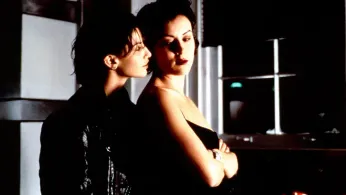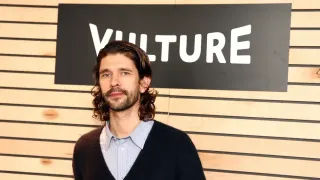
5 hours ago
Jennifer Tilly Reflects on ‘Bound’ and the Evolution of Queer Cinema: “It Was Considered Detrimental to Your Career to Play a Lesbian Character”
READ TIME: 3 MIN.
When ‘Bound’ premiered in 1996, Hollywood was a very different environment for LGBTQ+ stories and the actors who brought them to life. Today, as the film approaches its 30th anniversary, Jennifer Tilly—Oscar-nominated actor and GLAAD honoree—finds herself at the center of a renewed conversation about the film’s cultural resonance and the obstacles she and her colleagues faced to bring authentic queer representation to the screen .
‘Bound,’ directed by Lana and Lilly Wachowski in their feature debut, tells the story of Violet (Tilly) and Corky (Gina Gershon), two women who fall in love and orchestrate a daring heist from the mob. With its stylish neo-noir sensibility, the film delivered a bold and unapologetic portrayal of lesbian romance at a time when such stories were rare in mainstream cinema . Tilly recalls that, even before filming began, the project was considered controversial within the industry.
“When we went in, they said to us, ‘You will not believe the actresses who refused to come in and read’ because it was considered detrimental to your career to play a lesbian character,” Tilly told The Blade on the red carpet at Paramount Studios in Los Angeles. “But I was astonished because I thought, ‘This is the best script that I’ve read in such a long time with one of the best roles for women.’”
Even after the film’s release, Tilly and Gershon were aware of the risk they had taken. The film was initially mismarketed and had a brief theatrical run, yet it slowly gained a cult following—particularly among LGBTQ+ audiences who saw in it a rare authentic depiction of lesbian love and agency .
The significance of ‘Bound’ extends beyond its plot twists and stylish visuals. At a time when most mainstream queer cinema centered on gay male narratives, ‘Bound’ provided a rare and nuanced focus on lesbian protagonists. "At that time, there were hardly any lesbian representations in mainstream cinema. ... Just to have two people that happened to be in love and they both happened to be female was pretty groundbreaking," Tilly reflected in a recent interview .
The Wachowskis’ respectful approach to the material was crucial for Tilly and Gershon. “Of course, we were a little worried, Gina and I, that it might be pornographic — I mean, more pornographic than what we want, but the Wachowskis were so respectful,” Tilly said. Their commitment to authenticity and their resistance to sensationalism helped the film resonate with queer audiences, who often felt misrepresented or invisible in Hollywood storytelling .
Tilly’s account underscores the professional risks associated with queer roles in the 1990s. “They were telling me some of the actresses, and I was like, ‘I cannot believe that these actresses don't want to come in and read for the two best female parts that I've read in a very, very long time,’” she said . Despite the quality of the script and the opportunity to work with visionary directors, many actors feared that association with queer characters could lead to typecasting or career damage.
Those fears were not unfounded. Industry attitudes at the time frequently marginalized LGBTQ+ talent and stories, leading to a dearth of meaningful representation and opportunities. Tilly’s willingness to take the role—and the subsequent embrace of the film by queer audiences—helped pave the way for more inclusive casting and storytelling in the decades that followed .
The influence of ‘Bound’ continues to grow. The film is now regularly cited in lists of the best film noir and best lesbian movies, and its induction into the Criterion Collection this year has introduced it to new audiences . “It’s one of my favorite performances of all time, and I’m really happy the new generation is beginning to discover it,” Tilly shared .
The ongoing recognition of ‘Bound’ also speaks to broader shifts in Hollywood. Today, while challenges remain, LGBTQ+ representation is more visible and varied than ever before. Programs supporting women, transgender, and non-binary creators—such as Film Independent’s Project Involve and Netflix’s Proof of Concept Fellowship—reflect a growing industry commitment to inclusion and authentic storytelling .
Tilly’s advocacy does not end at the screen. This year, she was honored at Project Angel Food’s Angel Awards, where she spoke not only about her career but also about the importance of community organizations supporting LGBTQ+ individuals, particularly during the AIDS epidemic—a context that shaped her early years in the industry .
As ‘Bound’ approaches its 30th anniversary, its place in queer cinematic history is secure. For Jennifer Tilly, the film’s legacy is not just its cult status, but its role in carving out space for authentic LGBTQ+ stories in Hollywood—a legacy that continues to inspire filmmakers, actors, and audiences alike .






